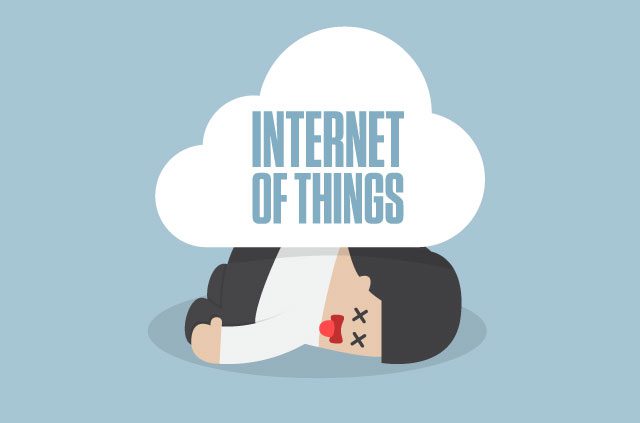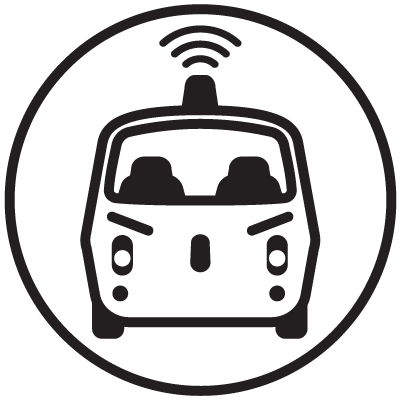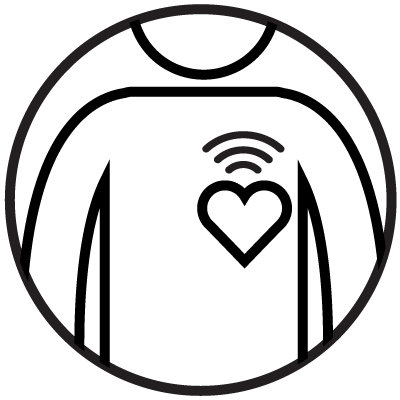
This post was originally published on January 9, 2017.
The Internet of Things is the connection of any device to the internet. So-called “smart devices” are made to enhance your life and make things a little easier.
At least, that’s what they’re supposed to do. But what if things go wrong?
Could the Internet of Things kill you? They certainly could. Let’s examine how.

1. Your smart car should choose to kill you
Self-driving cars have long been a staple of sci-fi books and movies. They’re awesome, second only to flying cars, and, best of all, they’re finally here.
But smart cars come with an inherent dilemma: Should they kill you? It sounds absurd, but most people think they should.
Imagine you’re happily moving along at 60mph, in your smart car, in your smart city, when a crowd of 11 people step into the road in front of you. The car cannot possibly stop in time, but it can avoid killing 11 people by steering you into a wall and killing you. What should it do?
Surveys have indicated that most people think the car should kill the driver to save the greatest number of lives, i.e., the 11 pedestrians who stepped in front of you.
So there you have it: Everyone thinks your car should kill you.

2. A smart pacemaker can be hacked and used to torture and kill you
Hackers wield tremendous power online, but they can’t do much damage in the real world, right? Wrong. They could kill you.
Some students at the University of South Alabama managed to hack iStan and made him die.
iStan is a medical simulation that realistically copies a human being on the internet. Medical schools use iStan for training, as, for some reason, real people don’t like being tested on, or killed, by med students. iStan mimics human cardiovascular, respiratory, and neurological systems. So if iStan is injured, his vital systems will respond in kind, just like a real person.
Of course, hackers breached poor iStan and took control of his pacemaker, torturing the poor soul, before ultimately killing him.
As Mike Jacobs, one of the hackers, told Motherboard:
“The simulator had a pacemaker so we could speed the heart rate up, we could slow it down. If it had a defibrillator, which most do, we could have shocked it repeatedly. If it was the intent, we could definitely cause harm to the patient.”
Worryingly, Jacobs continues:
“It’s not just a pacemaker; we could do it with an insulin pump, or a number of things that would cause life-threatening injuries or death.”
Gulp. R.I.P., iStan.

3. An incorrectly configured smart kitchen will kill you
Your kitchen could kill you in a couple of ways. Your smart fridge could order you rat poison instead of salt, by “mistake,” or it could mess with your safety limits.
Most kitchens these days have a carbon monoxide alarm. Of course, it’s rare for modern devices to output poisonous gas, but if they do, it would be unnoticeable. Carbon monoxide is both colorless and odorless, so we rely on an alarm to tell us if we’re in imminent danger of being killed.
Typically a sticky pad on the fridge is sufficient for deadly gas testing, but as we move toward smart tech, all alarms are synced up and broadcast to your phone or home hub. All it takes is a faulty boiler and a decimal in the wrong place and next time you take a nap, it could be a long one.

4. Smart devices that regulate water toxicity levels could break, and everyone will die
Any device that automatically controls water toxins needs to be working 100%, 100% of the time.
Many countries put fluoride in the water for the dental health benefits, but it is a toxic substance. As of 2015, the United States Health and Human Services Department recommends a maximum of 0.7 milligrams of fluoride per liter of water, which is not a lot. But if a smart system accidentally pumped in 7 grams, we’re in trouble.
If there’s nothing to drink, we’re all gone. And that’s if we’re alerted of the contamination before we drink the poison juice and die slow, painful fluoride deaths.

5. A.I. could decide to destroy humanity
Smart devices could gain self-awareness as a result of their application into billions of computer servers around the planet. Once humans realize the power and control of the ubiquitous devices, presumably they would try to deactivate them.
In the interest of self-preservation, smart devices would attempt to destroy humanity by using themselves, complete control of the internet, and unkillable robot death machines.
At least, that’s what happens in the Terminator.
How to survive the IoT apocalypse
A VPN will help you out with the hacking by disguising your IP address and making it harder for hackers to locate you. A VPN for routers will work best, as everything that connects to the router is automatically protected.
As for errors, you should definitely check the numbers in your smart apps from time to time. Make sure all is correct and working properly. An eventual death by smart car may be inevitable, but at least Arnold Schwarzenegger is still around to protect us from Skynet.
Take the first step to protect yourself online. Try ExpressVPN risk-free.
Get ExpressVPN





Comments
*chucks fitbit into ocean*
That is probably a good idea.
My i-phone freezed express VPN so I deleted. How can I reinstall ?
Hi, Nobutaka, please contact Support and someone will help you out.
Hi, this blog was hilarious to read. I don't read blogs a lot but definitely look forward to Johnny future posts !
Thanks! Glad you like it. There's plenty more in the pipeline, so hope you stick around to see them :)
Amazing write up. Enjoyed reading it and got express vpn too. Please write more blogs
Thanks, Karan! Really happy you like it :) You might enjoy this one too: When the Internet of Things goes rogue.
Decided to live inside a box finally!
Don't forget the tinfoil helmet! :)